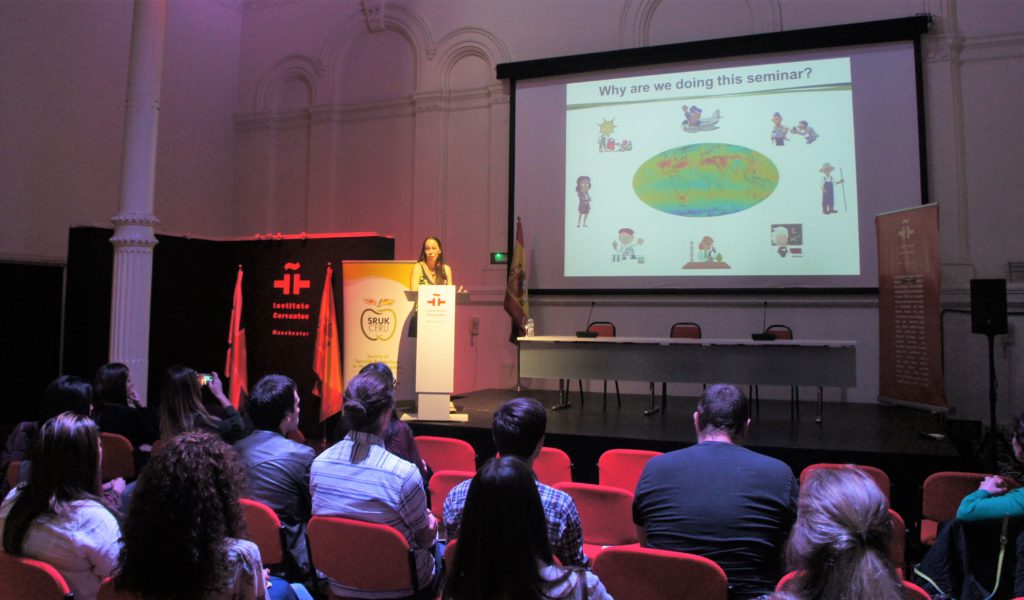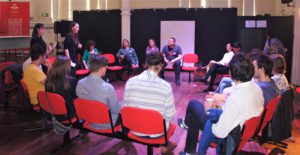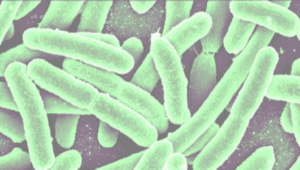Earth Day, a day dedicated to protecting the planet we live in, is celebrated every 22nd of April since 1970. This day encourages us to think and become more aware of the environmental problems and challenges we are facing, and the importance of committing ourselves to solve them. Millions of people celebrate this day every year by each planting a tree, encouraging a friend to cycle instead of using the car, reducing the use of plastic or participating in activities and debates on different challenges affecting the Earth, such as the climate change.
The SRUK North West constituency celebrated this day by organizing a seminar on Climate Change and Sustainability with Dr. Ana Payo (University of Aberdeen), Dr. Rachel Freeman, Dr. Sherilyn MacGregor, and Joe Blakey (University of Manchester) as invited speakers. This post summarises the main ideas presented in the event.

Introduction to the seminar “Climate Change and Sustainability” by one of the organizers Dra. Laura Castañar. This event was funded by Ramón Areces Foundation and the collaboration of the Cervantes Institute in Manchester.
Despite being a global problem, climate change has a greater impact on certain populations – affecting people differently depending on their social status or geographical location. Climate change is therefore not only an environmental problem but a complex (in) justice problem too. There is a clear relationship between gender and climate change. Women and children are more vulnerable to its effects and the associated environmental catastrophes (e.g. floods and major storms). In fact, the majority of victims of the natural disasters over the past 70 years have been women and children. This is related with the fact that women are usually responsible for taking care of families, and when facing a natural disaster, they are the last ones to leave the house and get to safety. In addition, when resources become limited after a natural disaster, women refuse to eat in favour of their children and husbands. Further, tensions created in situations of scarcity can lead to an increased risk of physical violence. All of this has led to more and more people demanding a greater voice and representation of women and vulnerable populations in decision-making policies against climate change.
There is a wide range of attitudes towards climate change: from totally sceptical people who deny its existence, to “converted” sceptics who – in light of the most dramatic effects – have changed their attitude in the recent years, to people who are very enthusiastic and are completely committed to doing everything in their power to stop it. Given this diversity of attitudes, science communication to the general public about the impact, causes, consequences and possible mitigations of climate is extremely important. Indeed, there are currently more than 10,000 researchers working in climate change related projects.
What are the global climate change actions? There are two main ones: mitigation and adaptation. Mitigation actions aim to reduce emissions and increase greenhouse gas sinks (for example, encouraging the use of renewable energies and reducing fossil fuels use), whilst adaptation measures are based on actions to enable human societies and ecosystems to survive under the impact of climate change (for example by designing better emergency protocols or increasing the biodiversity of agricultural landscapes). A third more controversial action, still in development, is climate engineering to reduce the temperature of the planet by directly intervening in climate processes (e.g. spraying sulphur to reduce solar insolation which mimics the effect of volcanic eruptions).

Round table about sustainability led by Marc Hudson.
We finished our event with a round table led by Marc Hudson (University of Manchester and editor of the Manchester Climate Change Monthly), discussing the actions we can carry out as citizens to fight climate change and promote sustainable development for the planet. From cycling and avoiding plastic, consuming local and ecological products, reducing meat consumption, going to bars and restaurants which care about the impact of their products, using teleconferences for meetings instead of traveling long distances, to send an email to your city council and political representatives asking for real actions to mitigate the impact of our cities. There are many and varied actions that we can take. Changing our habits one by one and finding small actions are a good way to start taking care of the planet. We must not forget that small actions and commitments at the local level may end up having an effect at the global scale: “think globally, act locally”.
Earth Day should not be only on the 22nd of April. Earth is the place we live 365 days a year, and it is important that we commit ourselves to its daily care in order to safeguard its and our future.
By Dr. Beatriz Baño-Otálora (SRUK North-West). Editor of this blog and SRUK press officer.
More information:
http://eige.europa.eu/rdc/eige-publications/gender-environment-and-climate-change
https://theconversation.com/can-a-city-ever-be-truly-carbon-neutral-93589






